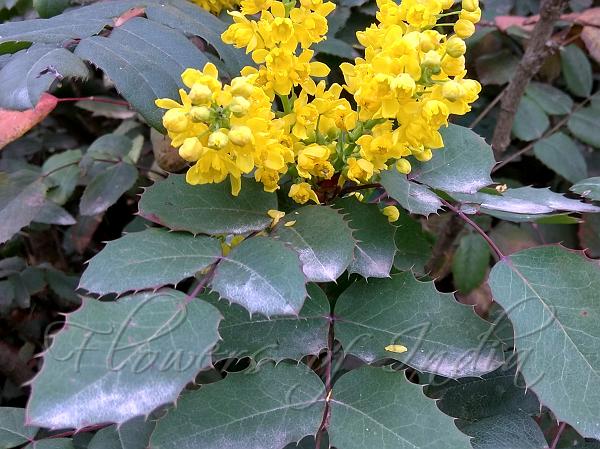|
| Holly-Leaf Barberry |
|

|

| File size | 807002 |
| Original date | 4/4/19 5:01 PM |
| Resolution | 3120 x 4160 |
| Flash | Flash did not fire, auto |
| Focal length | 3.57mm |
| Exposure time | 1/183s |
| Aperture | 2.0 |
| Focus Distance | |
| Metering Mode | Center weighted average |
| Camera make | Xiaomi |
| Camera model | Redmi Note 4 |
| Sensor type | OneChipColorArea |
|
|
|
|
Photo: |
Botanical name: Berberis aquifolium Family: Berberidaceae (Barberry family)
Synonyms: Mahonia aquifolium
Synonyms: Mahonia aquifolium
Holly-Leaf Barberry is an evergreen shrub, 0.3-3 m
tall. Bark of 2nd-year stems gray-brown or purplish, hairless. Spines
are absent. Leaves are 5-9-foliolate; leaf-stalks 1-6 cm. Leaflets are
thin and flexible or rather rigid; surfaces below glossy, smooth, above
glossy, green; end leaflet stalked, blade 5.1-8.7 x 2.4-4.5 cm, 1.7-2.5
times as long as wide; lateral leaflet blades lance-ovate to
lance-elliptic, 1-3-veined from base, base blunt or flat, rarely weakly
heart-shaped, margins plane or wavy, toothed, each with 5-21 teeth 0-2
mm tipped with spines to 0.8-2.2 x 0.2-0.3 mm, tip pointed or sometimes
blunt or rounded. Yellow flowers are borne in dense, 30-60-flowered
racemes, 3-9 cm; bracteoles membranous, tip rounded or blunt, sometimes
apiculate. Flowers: anther filaments with distal pair of recurved
lateral teeth. Berries are blue, glaucous, oblong-ovoid, 6-10 mm,
juicy, solid. Holly-Leaf Barberry is native to SW Canada to N
California, cultivated and naturalized in many parts of the world,
including Kashmir.
Medicinal uses: Oregon grape was often used by
several native North American Indian tribes to treat loss of appetite
and debility. Its current herbal use is mainly in the treatment of
gastritis and general digestive weakness, to stimulate the kidney and
gallbladder function and to reduce catarrhal problems.
Oregon grape was often used by
several native North American Indian tribes to treat loss of appetite
and debility. Its current herbal use is mainly in the treatment of
gastritis and general digestive weakness, to stimulate the kidney and
gallbladder function and to reduce catarrhal problems.
Medicinal uses:
 Oregon grape was often used by
several native North American Indian tribes to treat loss of appetite
and debility. Its current herbal use is mainly in the treatment of
gastritis and general digestive weakness, to stimulate the kidney and
gallbladder function and to reduce catarrhal problems.
Oregon grape was often used by
several native North American Indian tribes to treat loss of appetite
and debility. Its current herbal use is mainly in the treatment of
gastritis and general digestive weakness, to stimulate the kidney and
gallbladder function and to reduce catarrhal problems. | Identification credit: Akhtar Malik | Photographed in Kashmir University, Srinagar. |
• Is this flower misidentified? If yes,